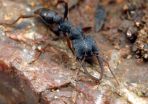(Press-News.org) WASHINGTON (March 31, 2014) — Patients with severe ischemic heart disease and heart failure can benefit from a new treatment in which stem cells found in bone marrow are injected directly into the heart muscle, according to research presented at the American College of Cardiology's 63rd Annual Scientific Session.
"Our results show that this stem cell treatment is safe and it improves heart function when compared to placebo," said Anders Bruun Mathiasen, M.D., research fellow in the Cardiac Catherization Lab at Rigshospitalet University Hospital Copenhagen, and lead investigator of the study. "This represents an exciting development that has the potential to benefit many people who suffer from this common and deadly disease."
Ischemic heart disease, also known as coronary artery disease, is the number one cause of death for both men and women in the United States. It results from a gradual buildup of plaque in the heart's coronary arteries and can lead to chest pain, heart attack and heart failure.
The study is the largest placebo-controlled double-blind randomized trial to treat patients with chronic ischemic heart failure by injecting a type of stem cell known as mesenchymal stromal cells directly into the heart muscle.
Six months after treatment, patients who received stem cell injections had improved heart pump function compared to patients receiving a placebo. Treated patients showed an 8.2-milliliter decrease in the study's primary endpoint, end systolic volume, which indicates the lowest volume of blood in the heart during the pumping cycle and is a key measure of the heart's ability to pump effectively. The placebo group showed an increase of 6 milliliters in end systolic volume.
The study included 59 patients with chronic ischemic heart disease and severe heart failure. Each patient first underwent a procedure to extract a small amount of bone marrow. Researchers then isolated from the marrow a small number of mesenchymal stromal cells and induced the cells to self-replicate. Patients then received an injection of either saline placebo or their own cultured mesenchymal stromal cells into the heart muscle through a catheter inserted in the groin.
"Isolating and culturing the stem cells is a relatively straightforward process, and the procedure to inject the stem cells into the heart requires only local anesthesia, so it appears to be all-in-all a promising treatment for patients who have no other options," Mathiasen said.
Although there are other therapies available for patients with ischemic heart disease, these therapies do not help all patients and many patients continue to face fatigue, shortness of breath and accumulation of fluid in the lungs and legs.
Previous studies have shown mesenchymal stromal cells can stimulate repair and regeneration in a variety of tissues, including heart muscle. Mathiasen said in the case of ischemic heart failure, the treatment likely works by facilitating the growth of new blood vessels and new heart muscle.
The study also supports findings from previous, smaller studies, which showed reduced scar tissue in the hearts of patients who received the stem cell treatment, offering additional confirmation that the treatment stimulates the growth of new heart muscle cells.
The researchers will continue to monitor the patients to assess their long-term outcomes.
"We hope that the improvements in heart pump function will not only improve the patients' symptoms but also will result in increased survival for these severely diseased patients," Mathiasen said.
A larger, Phase III clinical trial will be needed to move toward approval of this treatment as a more widely used therapy for ischemic heart failure.
"Our results should offer sufficient evidence that a larger trial is indeed warranted as a next step," Mathiasen said.
INFORMATION:The study was funded by grants from several private foundations.
The ACC's Annual Scientific Session brings together cardiologists and cardiovascular specialists from around the world each year to share the newest discoveries in treatment and prevention. Follow @ACCMediaCenter and #ACC14 for the latest news from the meeting.
The American College of Cardiology is a nonprofit medical society comprised of 47,000 physicians, surgeons, nurses, physician assistants, pharmacists and practice managers. The College is dedicated to transforming cardiovascular care, improving heart health and advancing quality improvement, patient-centered care, payment innovation and professionalism. The ACC also leads the formulation of important cardiovascular health policy, standards and guidelines. It bestows credentials upon cardiovascular specialists, provides professional education, supports and disseminates cardiovascular research, and operates national registries to measure and promote quality care. For more information, visit CardioSource.org.
New human trial shows stem cells are effective for failing hearts
Injecting bone marrow-derived stem cells directly into heart muscle improves heart function
2014-03-31
ELSE PRESS RELEASES FROM THIS DATE:
Real-world heart procedure results consistent with scientific research
2014-03-31
WASHINGTON (March 31, 2014) — The first one-year outcomes data of transcatheter heart valve replacement (TAVR) in nearly all U.S. patients undergoing this procedure shows that real-world outcomes are comparable to or slightly better than those found in clinical trials, according to registry data presented at the American College of Cardiology's 63rd Annual Scientific Session. However, specific baseline characteristics of patients undergoing TAVR are associated with differing degrees of death and survival and may be important considerations for patient counseling and shared ...
Newly discovered molecule may offer hope for immune disorders and runaway inflammation
2014-03-31
A new research discovery published in the April 2014 issue of the Journal of Leukocyte Biology may open the door to new therapies that help treat immune disorders or curb runaway inflammation. Specifically, scientists have discovered a molecule that can induce cell death (apoptosis) in a key type of immune cell (dendritic cells). With this understanding, it may be possible to develop new therapies that essentially shut down dendritic cell activity, and thereby reducing an immune reaction.
"We hope that our findings provide better understanding of immune regulation, which ...
NASA releases images of X-class solar flare
2014-03-31
The sun emitted a significant solar flare, peaking at 1:48 p.m. EDT March 29, 2014, and NASA's Solar Dynamics Observatory captured images of the event. Solar flares are powerful bursts of radiation. Harmful radiation from a flare cannot pass through Earth's atmosphere to physically affect humans on the ground, however -- when intense enough -- they can disturb the atmosphere in the layer where GPS and communications signals travel.
To see how this event impacted Earth, please visit NOAA's Space Weather Prediction Center at http://spaceweather.gov, the U.S. government's ...
Stats show growth of breast lifts outpacing implants 2 to 1
2014-03-31
VIDEO:
New statistics from the American Society of Plastic Surgeons show that since 2000, breast lift procedures have grown by 70 percent, twice the rate of breast implants. According to the...
Click here for more information.
ARLINGTON HEIGHTS, Ill., March 31, 2014 – New statistics released today by the American Society of Plastic Surgeons (ASPS) show that breast lift procedures are growing at twice the rate of breast implant surgeries. Since 2000, breast lifts have grown by ...
Comparison of drug-releasing stents show similar safety outcomes after 2 years
2014-03-31
A comparison of the safety of biodegradable polymer biolimus-eluting stents vs durable polymer everolimus-eluting stents finds similar outcomes for measures including death and heart attack after two years, according to a JAMA study released online to coincide with presentation at the 2014 American College of Cardiology Scientific Sessions.
Recent studies have raised concerns about the safety of biodegradable polymer drug-eluting stents (BP-DES) compared with durable polymer everolimus-eluting stents (DP-EES). The NOBORI Biolimus-Eluting vs XIENCE/PROMUS Everolimus-Eluting ...
Six new Dracula ants from Madagascar: Minor workers become queens in Mystrium
2014-03-31
Six new species of Dracula ants from the Malagasy region have been discovered by scientists at the California Academy of Sciences. The discoveries, by postdoctoral fellow Masashi Yoshimura from Japan and curator of entomology Brian L. Fisher, represent a completely new twist in the typically rigid caste system of ants, where anatomy is typically destiny. The study was published in the open access journal ZooKeys.
"The genus Mystrium is the most mysterious group within the bizarre Dracula ants," said Yoshimura.
Mystrium species have unique features such as long, spatulate ...
Study further illuminates heart-healthy benefits of Mediterranean diet
2014-03-31
(WASHINGTON, March 31, 2014) – New research further illuminates the heart-healthy benefits of the Mediterranean diet, tying the eating plan to lower levels of platelets and white blood cells, two markers of inflammation. Inflammation has an association with greater risk of heart attack and stroke. Study, results are published online today in Blood, the Journal of the American Society of Hematology (ASH).
The Mediterranean diet, characterized by generous servings of foods such as greens, whole grains, fish, and olive oil, has long been hailed as a heart-healthy eating ...
Scientists discover a number of novel genetic defects which cause oesophageal cancer
2014-03-31
A team of scientists from the Cancer Science Institute of Singapore (CSI Singapore) at the National University of Singapore and National University Cancer Institute Singapore (NCIS), and their collaborators from the Cedars-Sinai Medical Centre, UCLA School of Medicine, demonstrated that a number of novel genetic defects are able to induce oesophageal cancer.
The research group, led by Professor H. Phillip Koeffler, Senior Principal Investigator at CSI Singapore and Deputy Director of NCIS, has conducted a successful comprehensive genomic study of oesophageal squamous ...
What will climate policy mean for coal?
2014-03-31
Limiting climate change to 2°C means shutting down coal power plants - an unpopular proposition for coal power companies. But a new study shows that delaying climate policies could prove even worse for power plant owners.
Coal power plants are a major source of greenhouse gas emissions, and new plants are planned around the world, particularly in India and China. These new power plants are built to run for 30-50 years, paying off only after years of operation. But stringent climate policies could make the cost of emission so high that coal power generation is no longer ...
Online self-injury information often inaccurate, study finds
2014-03-31
People seeking help or information online about cutting and other forms of self-injury are likely finding falsehoods and myths, according to new research from the University of Guelph.
Only about 10 per cent of websites providing information about non-suicidal self-injury (NSSI) are endorsed by health or academic institutions, according to a study published recently in JAMA Pediatrics, a journal of the American Medical Association.
It's a troubling finding, says lead author Stephen Lewis, a Guelph psychology professor. "This is a salient public health issue," he said.
People ...
LAST 30 PRESS RELEASES:
Kennesaw State's Vijay Anand honored as National Academy of Inventors Senior Member
Recovery from whaling reveals the role of age in Humpback reproduction
Can the canny tick help prevent disease like MS and cancer?
Newcomer children show lower rates of emergency department use for non‑urgent conditions, study finds
Cognitive and neuropsychiatric function in former American football players
From trash to climate tech: rubber gloves find new life as carbon capturers materials
A step towards needed treatments for hantaviruses in new molecular map
Boys are more motivated, while girls are more compassionate?
Study identifies opposing roles for IL6 and IL6R in long-term mortality
AI accurately spots medical disorder from privacy-conscious hand images
Transient Pauli blocking for broadband ultrafast optical switching
Political polarization can spur CO2 emissions, stymie climate action
Researchers develop new strategy for improving inverted perovskite solar cells
Yes! The role of YAP and CTGF as potential therapeutic targets for preventing severe liver disease
Pancreatic cancer may begin hiding from the immune system earlier than we thought
Robotic wing inspired by nature delivers leap in underwater stability
A clinical reveals that aniridia causes a progressive loss of corneal sensitivity
Fossil amber reveals the secret lives of Cretaceous ants
Predicting extreme rainfall through novel spatial modeling
The Lancet: First-ever in-utero stem cell therapy for fetal spina bifida repair is safe, study finds
Nanoplastics can interact with Salmonella to affect food safety, study shows
Eric Moore, M.D., elected to Mayo Clinic Board of Trustees
NYU named “research powerhouse” in new analysis
New polymer materials may offer breakthrough solution for hard-to-remove PFAS in water
Biochar can either curb or boost greenhouse gas emissions depending on soil conditions, new study finds
Nanobiochar emerges as a next generation solution for cleaner water, healthier soils, and resilient ecosystems
Study finds more parents saying ‘No’ to vitamin K, putting babies’ brains at risk
Scientists develop new gut health measure that tracks disease
Rice gene discovery could cut fertiliser use while protecting yields
Jumping ‘DNA parasites’ linked to early stages of tumour formation
[Press-News.org] New human trial shows stem cells are effective for failing heartsInjecting bone marrow-derived stem cells directly into heart muscle improves heart function


